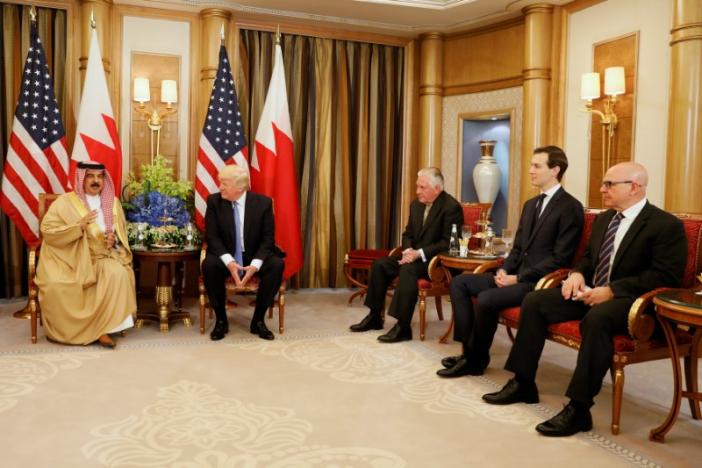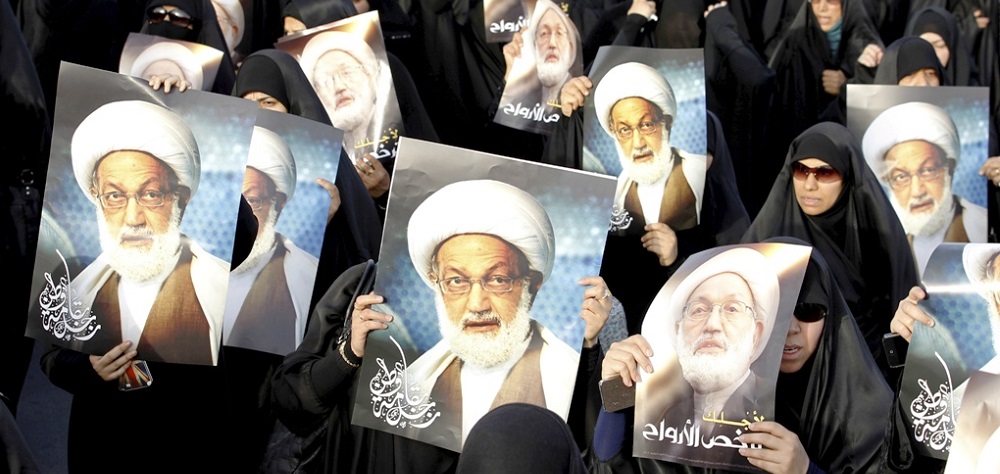Alwaght- Bahraini regime has issued an unjust verdict against top Islamic scholar Ayatollah Sheikh Isa Qassim on the day the regime's King Al Khalifa was meeting US President Donald Trump in Riyadh.
On Sunday, a Bahraini court sentenced, Sheikh Qassim, spiritual leader of the country's Shiite Muslims majority, to one year in jail suspended for three years. The court further ruled to confiscate properties managed by Ayatollah Qassim worth 3 million Bahraini dinars (almost $8 million) and two of his homes.
The court also ordered Ayatollah Qassim, who is in his mid-70s, to pay 100,000 Bahraini dinars ($265,266) in fines over the charges, which emanate from the collection of Islamic tax called Khums, which in Shiite Islam is collected and spent by a senior cleric in the interests of the needy.
In Shiite Islam, Khums is part Furu' al-Deen which means the branches of religion it is one-fifth of the amount of a year's savings, (after deducting all the lawful expenses from the earnings of that year).
Therefore, in a country such as Bahrain where the majority of Muslims adhere to Shiite Islam, criminalizing the collection of Khums is tantamount to suppression of religious beliefs and obligations. The Manama regime has not only criminalized the collection of Khums but has gone ahead and grabbed properties worth $8 Million acquired from contribution by Shiite Muslims in the Persian Gulf Kingdom for distribution to the needy.
Disenfranchising Shiite Muslims
In reaction to the repressive verdict, Bahrain's senior Islamic scholars have said that the trial and conviction of Sheikh Qassim, represented a major shock. They believed it also represents "the persecution of the Shiite Islam and its beliefs", while warning that the verdict which disenfranchises Shiites will have grim repercussions.
In a statement, the senior Islamic scholars noted that "Ayatollah Qassim has a distinguished place in the public's sentiment", stressing that violating the belief in Khums is considered a flagrant violation of the Shiite teachings.
Shiite Muslims have been denied the right of having Members of Parliament, their media outlets have been closed while their main political party, Bahrain have been denied the right to have any media outlet while al-Wefaq National Islamic Society has been banned.
Most of the leaders of al-Wefaq have seen their citizenship revoked or jailed, including its spiritual leader Sheikh Qassim, and its secretary general Sheikh Ali Salman.
By confiscating finances managed by Ayatollah Qassim and seizing his properties while prohibiting him from collecting Khums, the Bahraini regime intends to cripple his activities and prevent him from assisting marginalized Shiite Muslims while curtailing the spread of Shiite Islam in the tiny Persian Gulf kingdom.
Bahrainis have persisted in resistance
The Bahraini regime was expected to issue a tougher verdict against Ayatollah Qassim but could not dare execute such a move in fear of far reaching repercussions. Masses in Bahrain have shown the ability for consistency in their resistance against the western-backed Al Khalifa regime. Since the beginning of the Islamic awakening uprising in February 2011, Bahrainis have demonstrations on an almost daily basis demanding that the Khalifah dynasty relinquish power and a just system representing all Bahrainis be established. Despite the presence of Saudi and UAE troops assisting regime forces in the crackdown, the masses have persisted in their resistance. Anti-regime demonstrators have also been staging sit-in protests in Diraz village since June outside the residence of Sheikh Qassim to express their solidarity with the 79-year-old cleric since authorities revoked Sheikh Qassim’s citizenship last year.
Trump backs suppression of Shiites Muslims in Bahrain
The jailing of Sheikh Qassim on the day US President Donald Trump met Bahraini ruler Sheikh Hamad bin Isa al-Khalifa in Riyadh sends a message that Washington fully backs the Manama regime in its suppression of Shiite Muslims in the tiny Persian Gulf Kingdom.

Trump told the Bahriani ruler that, “We’re going to have a very, very long-term relationship. I look forward to it very much - many of the same things in common.”
Trump’s White House decided this year to pursue a $5 billion sale to Bahrain of 19 Lockheed Martin F-16 aircraft and related equipment, which was held up last year by human rights concerns.
Washington is throwing its weight behind the brutally repressive Al Khalifah regime, because Bahrain serves as the base for the US Fifth Fleet.



























